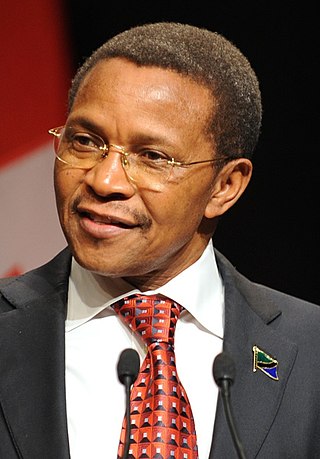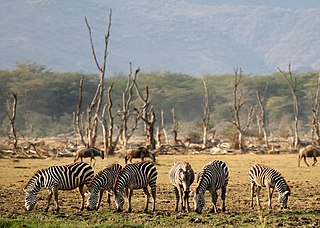
Maasai Mara, also sometimes spelled Masai Mara and locally known simply as The Mara, is a large national game reserve in Narok, Kenya, contiguous with the Serengeti National Park in Tanzania. It is named in honour of the Maasai people, the ancestral inhabitants of the area, who migrated to the area from the Nile Basin. Their description of the area when looked at from afar: "Mara" means "spotted" in the local Maasai language, because of the short bushy trees which dot the landscape.

Tanzania, officially the United Republic of Tanzania, is a country in East Africa within the African Great Lakes region. It is bordered by Uganda to the northwest; Kenya to the northeast; the Indian Ocean to the east; Mozambique and Malawi to the south; Zambia to the southwest; and Rwanda, Burundi, and the Democratic Republic of the Congo to the west. Mount Kilimanjaro, Africa's highest mountain, is in northeastern Tanzania. According to the 2022 national census, Tanzania has a population of around 62 million, making it the most populous country located entirely south of the equator.

Jakaya Mrisho Kikwete is a Tanzanian politician who was the fourth president of Tanzania, in office from 2005 to 2015.

Ngorongoro Conservation Area is a protected area and a UNESCO World Heritage Site located in Ngorongoro District, 180 km (110 mi) west of Arusha City in Arusha Region, within the Crater Highlands geological area of northeastern Tanzania. The area is named after Ngorongoro Crater, a large volcanic caldera within the area. The Ngorongoro Conservation Area Authority administers the conservation area, an arm of the Tanzanian government, and its boundaries follow the boundary of the Ngorongoro District in Arusha Region. The western portion of the park abuts the Serengeti National Park, and the area comprising the two parks and Kenya's Maasai Mara game reserve is home to Great Migration, a massive annual migration of millions of wildebeest, zebras, gazelles, and other animals. The conservation area also contains Olduvai Gorge, one of the most important paleoanthropological sites in the world.

Trophy hunting is a form of hunting for sport in which parts of the hunted wild animals are kept and displayed as trophies. The animal being targeted, known as the "game", is typically a mature male specimen from a popular species of collectable interests, usually of large sizes, holding impressive horns, antlers, furs, or manes. Most trophies consist of only select parts of the animal, which are prepared for display by a taxidermist. The parts most commonly kept vary by species but often include the head, hide, tusks, horns, or antlers.

Lake Manyara National Park is a protected area in Tanzania's Arusha and Manyara Regions, situated between Lake Manyara and the Great Rift Valley. It is administered by the Tanzania National Parks Authority, and covers an area of 325 km2 (125 sq mi) including about 230 km2 (89 sq mi) lake surface. More than 350 bird species have been observed on the lake.

Russell Errol Train was the second administrator of the Environmental Protection Agency (EPA), from September 1973 to January 1977 and the founder chairman emeritus of World Wildlife Fund (WWF). As the second head of the EPA under Presidents Richard Nixon and Gerald Ford, Train helped place the issue of the environment on the presidential and national agenda in the late 1960s and early 1970s, a key period in the environmental movement. He was a conservative who reached out to the business community and Republicans. He promulgated the idea that as the economy of the nation was growing quickly, public as well as private projects should consider and evaluate the environmental impacts of their actions.

Tanzania is a country with many tourist attractions. Approximately 38 percent of Tanzania's land area is set aside in protected areas for conservation. There are 17 national parks, 29 game reserves, 40 controlled conservation areas and marine parks. Tanzania is also home to Mount Kilimanjaro, the highest point in Africa.
The School of Global Development is a department at the University of East Anglia, Norwich, England. Situated within the Faculty of Social Sciences, the School of International Development has been ranked in the top three British development studies departments.

African Parks is a non-governmental organization (NGO) focused on biodiversity conservation through protected area management, established in 2000 and headquartered in Johannesburg, South Africa. It was founded as the African Parks Management and Finance Company, a private company, then underwent structural changes to become an NGO called African Parks Foundation, and later renamed African Parks Network. The organization manages national parks and protected areas throughout Africa, in collaboration with governments and surrounding communities. African Parks manages 22 protected areas in 12 countries as of May 2023, and employs more than 5000 staff. Michael Eustace, Peter Fearnhead, Paul Fentener van Vlissingen, Anthony Hall-Martin, and Mavuso Msimang are credited as co-founders; Fearnhead continues to serve as chief executive officer. Prince Harry served as African Parks' president between 2017 and 2023 and later became a member of the board of directors.
Cynthia Jane Moss is an American ethologist and conservationist, wildlife researcher, and writer. Her studies have concentrated on the demography, behavior, social organization, and population dynamics of the African elephants of Amboseli. She is the director of the Amboseli Elephant Research Project, and is the program director and trustee for the Amboseli Trust for Elephants (ATE).
The African Wildlife Foundation (AWF) is an international conservation organization created with the intent of preserving Africa's wildlife, wild lands, and natural resources. Founded in 1961, the organization helped establish conservation programs at the College of African Wildlife Management, Mweka in Tanzania, and the Ecole de Faune de Garoua in Cameroon. The Foundation works with governments and businesses to develop conservation efforts as a source of revenue.
Helen Wanjiru Gichohi is a Kenyan ecologist who was President of the African Wildlife Foundation (AWF) from 2007 to 2013.

The International Gorilla Conservation Programme was formed in 1991 to ensure that the critically endangered mountain gorillas are conserved in their habitat in the mountain forests of the Virunga Massif in Rwanda, Uganda and the Democratic Republic of the Congo.

Lazaro Samuel Nyalandu is a Tanzanian politician and former Minister of Natural Resources and Tourism.
Jim Justus Nyamu, of Nairobi, Kenya, is an elephant research scientist and activist against poaching and trade in ivory. Nyamu is the executive director at the Elephant Neighbors Center (ENC) and is leader of the movement, Ivory Belongs to Elephants. He has also held positions at the African Conservation Centre and Kenya Wildlife Service. The ENC is a grass-roots collaborative and participatory research organization focused on enhancing the capacity of communities living with wildlife to promote interlinkages between species and their habitats.

Fortress conservation is a conservation model based on the belief that biodiversity protection is best achieved by creating protected areas where ecosystems can function in isolation from human disturbance.












